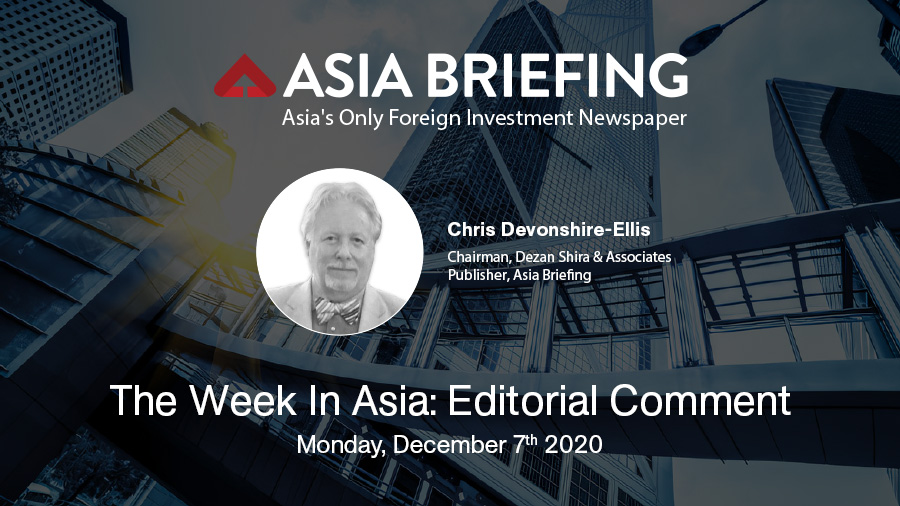Monday, December 7

By Chris Devonshire-Ellis
Welcome to the weeks Asia Briefing, in which we take a close look at the developments of Covid-19 and what can be expected across Asia in terms of vaccine availability, covering China, India, ASEAN and Russia in some depth while also providing data on a further 30 Asian countries. It is obvious that vaccine roll out will not be even. It is also apparent that the vaccines developed in the West, which genetically engineer harmless viral material to include a Covid-19 gene, differ fundamentally from vaccines being developed in Asia which are mostly derived from dead Covid-19 genetic material. The former is marginally safer than the latter in terms of instigating an immune response, yet requires storage at sub-zero temperatures. The Asian vaccines require two doses to be effective, yet can be delivered at cool room temperatures, easier to get into supply chains in Southeast Asia, Africa and South America. It is also obvious that there will simply not be enough of either of them to go around. The Gavi and Covax programs cater for supplies to less-well off countries, who will receive doses equivalent to only 20% of their respective populations. These will inevitably find their way to ‘front line personnel’ – namely government officials, the military, police forces and the medical professions. Much of the general population throughout the Asian landmass will not receive vaccines until well into 2021 and into 2022. With Dr. Anthony Fauci, the Chief Medical Advisor to the United States Government stating that ending the pandemic requires at least 75% and preferably 85% of populations to receive treatment, it is clear that Covid-19 will be around for much of 2021 as well.
This means additional layers of corporate planning are required for 2021 – an issue my colleague Vivian Mao deals with in this weeks Dezan Shira & Associates Partners briefing – I advise all businesses and investors in Asia to read her words. They are based on years of experience of auditing foreign investors in Asia and provide great advise and tips for 2021 planning in what is shaping up to almost certainly be a stop-start year of ups and downs. We provide a series of articles on 2021 planning on a pan-Asian, detailed basis elsewhere on Asia Briefing. This is additionally enhanced by the new issue of China Briefing Magazine, which details audit and compliance issues for 2021. A complimentary download is available, subscription is required to access this and other magazines, however this is also free of charge. That can be obtained by clicking here.
Meanwhile, I had an interesting quick debate with Joerg Wutte, Chairman of the European Chamber of Commerce in China a couple of weeks ago, following comments he’d made on Linked In concerning the Human Rights issue in China. Joerg has been a long upstanding and serving member of the EU community in China for years, and is rightly regarded with much affection in China. Our brief discussion revolved really about whether Human Rights is more a business or political issue, queried by me in part because I have noticed more political commentary from the chamber in recent months. Joerg’s response was that he was being pressured by ‘Parliamentarians in the EU’ about the matter. I’ve looked at the European Chambers charter, and nowhere does it mention politics, or Parliamentarians. This concerns me; EU Parliamentarian’s pressuring a Chamber of Commerce to take a view on their political concerns is not entirely right. Firstly, the Chamber should be run for the benefit of its paying members, not politicians, after all it is the European Chamber of Commerce, not the European Chamber of Politics. The EU has its own Human Rights Council to look into such matters and I do not believe it is either the responsibility of the Chamber to take up such matters, nor especially beneficial to its actual members to do so. Perhaps ‘EU Parliamentarians’ can either take out a paid membership and satisfy the criteria in doing so, or direct their political issues to more appropriate channels. As a member of the European Chamber of Commerce, could we please have less China politicking and more on business issues?
Finally, in this week’s Asian Regional Focus series we examine the controversial China-Pakistan Economic Corridor (CPEC) and gain a closer look at what the Belt & Road initiative is providing for citizens of cities such as Karachi, Gwadar, Lahore and Islamabad. In our Special Focus we take a look at the development of Regional Digital Currencies.
Stay safe!
Best regards;

Chris Devonshire-Ellis
Chairman, Dezan Shira & Associates
Publisher, Asia Briefing
E: editor@asiabriefing.com
W: www.dezshira.com
Disclaimer
Any views or opinions represented in this blog are personal commentary, belong solely to the contributor and do not necessarily represent the views of Asia Briefing Limited or Dezan Shira & Associates.


